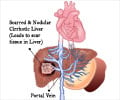Researchers have revealed that patients who undergo a liver transplant are at increased risk (they put as 3 times more likely) of developing cancer than the general population.
Transplantation, and subsequent immunosuppression which keeps rejection at bay, have long been associated with increased cancer risk.The research team led by Helena Isoniemi of Finland analysed cancer risk pattern in Finnish liver transplant patients from Helsinki University Central between 1982 and 2005.
Among the 540 liver transplant recipients, they found a total of 39 post-transplant de novo cancers in 36 patients.
The overall standardized incidence ratio (SIR) compared to the general population was 2.59. Non-Hodgkin lymphoma, non-melanoma skin cancer and basal cell carcinoma had significantly elevated SIRs.
"The most common cancer types in our cohort were lymphoma and skin cancer," the authors report.
"Non-Hodgkin lymphoma, which included four cases of post-transplant lymphoproliverative disorder, occurred more frequently in males, in patients transplanted at a younger age and soon after transplantation."
Advertisement
In an accompanying editorial by Ashok Kumar Jain of the University of Rochester reviewed the Aberg et al findings alongside the rest of the literature, looking closely at patient age and duration of follow-up.
Advertisement
He also pointed out that other reports have noted a significantly increased risk of de novo oropharyngeal and lung cancers amongst liver transplant patients that smoke, which is a potentially preventable condition.
Throughout the literature, Jain and his coauthors found wide variation in the reported incidence of post transplant cancers, partly related to the length of follow up and partly related to the inclusion or exclusion of lymphoid lesions.
"The overall rate of de novo solid tumors increased with age at the time of transplant and the length of follow up; while the rate of post-transplant lympho-proliferative disorders decreased with age at the liver transplant, with a higher incidence in the first few years," they conclude.
The study appears in Liver Transplantation, a journal by John Wiley and Sons.
Source-ANI
TAN















